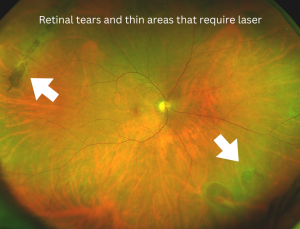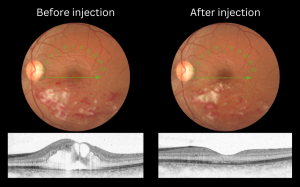QUICK LINKS
General FAQs on Retina
What is the Retina?
The eye has many different parts that help us see clearly. Just as a car has many parts that need to work well for it to run smoothly, different parts of the eye have to function well for us to enjoy good vision.
Among the vital parts in the eye is the retina. It is present inside the back portion of the eye. This thin paper like tissue sticks to the eye like a wallpaper. The retinal structure is very similar to nerves in other parts of the body and it continues backwards to the brain. The retina is the tissue responsible for converting light into signals that can be recognized as objects in our daily life by the brain.

Who is a Retina Specialist?
A medical doctor who has a basic medical degree completes a recognized post-graduation by training for a specified period to identify and treat disorders of the eyes. This branch of specialization is called Ophthalmology and the doctor is now an Ophthalmologist.
Further, some Ophthalmologists focus their attention on treating diseases occurring in the retina. They equip themselves by attending additional specialization programmers and become Retina Specialists.
Retina specialists use treatment methods like lasers, injections in the eye and / or microsurgeries to treat and stabilize problems arising in the retina. This is a highly specialized branch of medicine that requires a distinct sill set as highly precise work needs to be performed on delicate tissues in an incredibly small space.
What are the diseases that can affect my retina?
The retina is a living nervous tissue with rich blood supply. Proper nutrition is needed for its normal functioning. Any disease of the body that can interfere with function of blood vessels and nerves can affect the retina as well. Common examples are diabetes, hypertension, infections and allergies. Besides, there are few disorders that affect the retina specifically like detachment, macular degeneration in the elderly (Age Related Macular Degeneration) and disorders in premature babies (Retinopathy of Prematurity).
These retinal conditions can present with or without reduction in vision. Your retina specialist will be able to help you after checking your eyes in the clinic and, if needed, using additional retinal scans to pinpoint the problem.
I visited an eye doctor recently. I was told I need retina laser. I have already had laser lens surgery a few years ago. Why do I need laser again?
The eye has many parts. There are many “lasers” that are employed in the treatment of diseases that occur in different parts of the eye. Although the general term “laser” is applicable to all of them, each of these lasers are different and they serve completely different purposes.
A person who has narrowed passages for flow of fluids inside the eye can have a laser treatment to open a new path (laser iridotomy). A person who wishes to reduce his/her spectacle power can have a different laser for that (LASIK / SMILE). As mentioned in this question, currently cataract surgery is also done by assistance of a laser (FLACS) and a lens is then placed in the eye. These are examples of lasers that are done for other parts of the eye and not the retina.
Retina specialists, in turn, use special lasers to treat bleeding, swelling or holes in the retina. This laser treatment is completely different from the ones mentioned previously. A single eye may be treated with different types of lasers and in multiple sittings in order to stabilize the eye condition/s.

My father has been advised injection in the eye for a retina problem. We are keen to know more about the process.
Many diseases of the retina involve swelling and bleeding. Some of these conditions are treated by using special medicines that are injected into the eye so that they can reach and work on the retina quickly. These injections are given in the white part of the eye. Before giving the injection, your retina specialist will use eye drops to numb your eyes. Although the procedure is not very painful, patients report that they could feel the injection and see the medicine entering the eye.
It is important to remember that there are many medicines that can be injected in this manner. Each medicine acts for a specific period of time. An individual may require more than one injection in order to stabilize the condition.

My mother said she could not see clearly in one eye. We visited a doctor who has recommended retina surgery. Is it a painful surgery? How will it be done?
Today, technology has advanced and retinal surgeries are performed by making tiny openings that are less than 1 mm in the white part of the eye. Retina specialists recommend these surgeries if someone has problems in the retina related to bleeding, detachment or whole formation.
Usually, retinal surgeries are done after giving an injection near the eye to make the eye and its surrounding areas numb. So the patient is awake throughout the procedure. The surgery may take about an hour or so depending on the severity of the condition. After surgery, the eye will be closed with a bandage that is removed after a few hours. Some redness and swelling is expected around the operated eye. Your doctor would advise medications and appropriate follow-up intervals.

